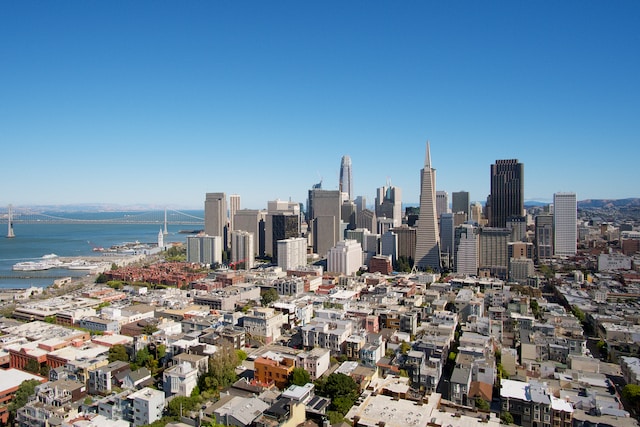When considering a move to the West Coast, two cities often stand out as prime destinations: Seattle and San Francisco.
In this comprehensive comparison of Seattle vs. San Francisco, we’ll explore key factors that may influence your decision to move to one of these iconic cities.
From the cost of living and crime rates to education and weather, our Seattle vs. San Francisco guide provides an in-depth analysis to help you make an informed choice.
Let’s dive into the details to uncover what makes each city unique and which one might be the perfect fit for you.
Quick Snapshot: Seattle vs. San Francisco
| Category | Seattle | San Francisco |
|---|---|---|
| Cost of Living | ||
| 1-Bedroom Rent | $2,070/month | $3,030/month |
| Income Tax | No state income tax | 8.0% |
| Crime & Safety | ||
| Violent Crime Rate | 8.02 per 1,000 people | 5.39 per 1,000 people |
| Career & Employment | ||
| Average Annual Salary | $75,569/year | $94,425/year |
| Education | ||
| University Rankings | University of Washington #29 | University of San Francisco #154 |
| Weather and Climate | ||
| Average Winter Temperature | 40°F – 50°F | 51°F – 59°F |
| Weather Characteristics | Mild, cloudy, rainy season | Mediterranean, cool summers |
1. Cost of Living

The cost of living is a critical factor for anyone considering relocation. It encompasses various expenses, including housing, taxes, groceries, and healthcare.
Comparing Seattle and San Francisco, we can see significant differences that may influence one’s choice between these two cities.
Avg. Cost of 1 Bed Room Rent
Seattle’s average 1-bedroom rent of $2,070/month is significantly lower than San Francisco’s $3,030/month.
This difference can translate into annual savings of over $11,000 for those living in Seattle.
For single individuals, young professionals, or couples without children, this cost difference can be a decisive factor, allowing for more disposable income or the ability to live in a more desirable neighborhood.
| Seattle | San Francisco |
| $2,070/month | $3,030/month |
Avg. Cost 2 Bed Room Rent
For families requiring more space, Seattle’s average 2-bedroom rent of $2,768/month is again more budget-friendly compared to San Francisco’s $4,100/month.
This difference of over $1,300 per month could be used towards other essential family expenses, such as education, healthcare, or savings. The lower rent may also enable families to live in areas with better schools or amenities.
| Seattle | San Francisco |
| $2,768/month | $4,100/month |
Avg. Cost of A House
The average cost of a house in Seattle is $823,900, while in San Francisco, it’s $1,237,600. This substantial price difference can impact not only the ability to purchase a home but also the size and quality of the property.
Homebuyers in Seattle may find more options in their budget, including homes with additional bedrooms, larger yards, or more modern features.
The lower cost also means potentially lower down payments and mortgage payments.
| Seattle | San Francisco |
| $823,900 | $1,237,600 |
Income Tax
Seattle’s lack of state income tax is a unique advantage, especially for higher earners. In contrast, San Francisco residents pay a state income tax of 8.0%.
For someone earning $100,000 annually, this could mean an additional $8,000 in taxes in San Francisco.
Over time, these savings could be invested, saved for retirement, or used for other financial goals.
| Seattle | San Francisco |
| No state income tax | 8.0% |
Property Tax
Property taxes are slightly lower in Seattle at 1.025% compared to San Francisco’s 1.1801%.
While the difference may seem small, it can add up over time, especially for more expensive properties.
For a $1,000,000 property, this could mean a yearly saving of over $1,500 in Seattle.
| Seattle | San Francisco |
| 1.025% | 1.1801% |
Sales Tax

Seattle’s higher sales tax of 10.25% compared to San Francisco’s 8.63% may offset some of the savings on income and property taxes.
Frequent shoppers, particularly those purchasing luxury goods or large-ticket items, may feel this difference more acutely.
However, the overall impact may vary depending on individual spending habits.
| Seattle | San Francisco |
| 10.25% | 8.63% |
Minimum Grocery Bill per Month
While data for San Francisco indicate a $573.08 minimum, Seattle’s minimum grocery bill of $502.82/month.
This figure can help potential movers budget for this essential expense.
Depending on local food preferences and shopping habits, this cost may vary, but it provides a starting point for financial planning.
| Seattle | San Francisco |
| $502.82/month recommended minimum | $573.08/month recommended minimum |
Average Healthcare Costs
Healthcare costs in Seattle and San Francisco are relatively similar, with slight variations in specific services like doctor’s and dentist’s visits.
These costs can vary depending on factors such as insurance coverage, healthcare provider, and individual health needs.
However, the similarity in costs suggests that healthcare expenses may not be a significant differentiator between the two cities.
| Seattle | San Francisco |
| Doctor’s Visit: $162.26Dentist Visit: $139.99 | Doctor’s Visit: $173.05Dentist Visit: $144.96 |
2. Crime & Safety
Safety is paramount when choosing a place to live. Analyzing crime rates and emergency response times can provide a clearer picture of the security environment in both Seattle and San Francisco.
Overall Crime Rate
Seattle’s overall crime rate is 63.5 per 1,000 people, slightly higher than San Francisco’s 54.33 per 1,000 people.
While both cities have crime rates that may be considered moderate, the slight difference could be indicative of various factors, such as population density, law enforcement strategies, or socioeconomic conditions.
Potential residents may wish to investigate specific neighborhoods within each city to understand localized crime patterns better.
| Seattle | San Francisco |
| 63.5 per 1,000 people | 54.33 per 1,000 people |
Violent Crime Rate
San Francisco’s violent crime rate of 5.39 per 1,000 people is higher than Seattle’s 8.02 per 1,000 people. Violent crimes include offenses like assault, robbery, and homicide.
This difference may be a concern for residents prioritizing personal safety. It could also influence decisions related to housing, schooling, and daily commuting.
Understanding the nature and location of these crimes within the city can provide a more nuanced perspective.
| Seattle | San Francisco |
| 8.02 per 1,000 people | 5.39 per 1,000 people |
Property Crime Rate
The property crime rate in Seattle is 55.47 per 1,000 people, slightly lower than San Francisco’s 48.94 per 1,000 people. Property crimes include theft, burglary, and vandalism.
The similarity in these rates suggests that residents in both cities face comparable risks regarding their possessions. Investing in security measures, such as alarms or secure parking, may be equally advisable in both locations.
| Seattle | San Francisco |
| 55.47 per 1,000 people | 48.94 per 1,000 people |
Police Response Time
Seattle’s average police response time is 10 minutes for priority 1 calls, while data for San Francisco is not available. This figure provides an indication of the efficiency and readiness of Seattle’s police force.
A shorter response time can be reassuring for residents, as it may lead to quicker resolutions in emergency situations.
Potential movers to San Francisco may wish to seek local data or consult with local law enforcement to understand response times in specific areas.
| Seattle | San Francisco |
| 10 Minutes | N/A |
*based on priority calls
Ambulance Response Time
Ambulance response times are similar in both cities, with Seattle at 11 minutes and San Francisco at 10 minutes for priority one responses.
These figures reflect the efficiency of emergency medical services in both locations.
Quick response times are vital in medical emergencies, where every minute can be crucial. The similarity in these times suggests that residents in both cities can expect timely medical assistance when needed.
| Seattle | San Francisco |
| 11 Minutes | 10 Minutes |
*priority one responses
3. Career & Employment

Career opportunities and employment conditions are vital for working professionals. Seattle and San Francisco offer different prospects in terms of salary, minimum wage, and unemployment rates.
Average Annual Salary
San Francisco’s average annual salary of $94,425 is notably higher than Seattle’s $75,569. This difference may be particularly attractive to professionals in industries that are prevalent in San Francisco, such as technology, finance, or biotechnology.
The higher salary can offset some of the increased living costs in San Francisco and may provide additional incentives such as career growth opportunities, networking, and access to cutting-edge research and development.
However, it’s essential to consider the entire compensation package, including benefits and work-life balance, as these factors may vary between the two cities.
| Seattle | San Francisco |
| $75,569/year | $94,425/year |
Minimum Wage
Seattle’s minimum wage of $18.69/hr is slightly higher than San Francisco’s $18.07/hr. While the difference may seem minimal, it can add up over time, especially for full-time, entry-level workers.
This higher minimum wage in Seattle may make the city more appealing to those starting their careers or working in lower-wage industries.
It reflects a commitment to workers’ rights and may be indicative of broader labor policies in the city, such as worker protections and benefits.
| Seattle | San Francisco |
| $18.69/hr | $18.07/hr |
Unemployment Rate
Both Seattle and San Francisco have unemployment rates that are performing well compared to the national average (3.6%), with Seattle at 3.4% and San Francisco at 3.2% as of February 2023.
These figures suggest robust local economies with diverse job opportunities across various sectors.
A low unemployment rate can be a positive sign for job seekers, indicating a healthy job market with potential for growth and stability.
However, it’s also worth considering the specific industries and roles available in each city, as the opportunities may align more closely with certain career paths or skill sets.
| Seattle | San Francisco |
| 3.4% | 3.2% |
4. Education

Education is a key consideration for families and students. Comparing universities and public school graduation rates can guide decisions related to schooling and higher education.
University Rankings
The University of Washington is ranked #29 in the US, while the University of San Francisco is ranked #154.
This significant difference in rankings may be a crucial factor for aspiring college students considering their higher education options.
Higher-ranked universities often offer more prestigious programs, renowned faculty, research opportunities, and potential career connections.
Students aiming for specific fields or looking for a highly competitive academic environment may find the University of Washington more appealing.
| University of Washington | University of San Francisco |
| #29 in US | #154 in US |
Public School Graduation Rates
San Francisco’s public school graduation rate is 88.5%, slightly higher than Seattle’s 86%.
This difference, though small, may reflect variations in educational quality, resources, teacher-to-student ratios, and community engagement.
Families prioritizing education may consider this factor when choosing neighborhoods and schools within the city.
A strong public school system can provide a solid foundation for children’s education and personal development, potentially influencing long-term academic and career success.
| Seattle | San Francisco |
| 86% | 88.5% |
5. Weather and Climate

Climate preferences vary widely, and understanding the weather characteristics of Seattle and San Francisco can help individuals choose a city that best suits their lifestyle.
Average Temperature
San Francisco’s climate offers milder winters, with temperatures ranging from 51°F to 59°F, and cooler summers, ranging from 58°F to 72°F.
In contrast, Seattle has a broader temperature range, with winters from 40°F to 50°F and summers from 69°F to 75°F.
These differences may be significant for those sensitive to temperature extremes or who have specific outdoor interests.
San Francisco’s milder climate may be more comfortable year-round, while Seattle’s cooler summers and colder winters may appeal to those who enjoy seasonal variations.
| Season | Seattle | San Francisco |
| Fall | 45°F – 58°F | 55°F – 71°F |
| Winter | 40°F – 50°F | 51°F – 59°F |
| Spring | 53°F – 69°F | 62°F – 69°F |
| Summer | 69°F – 75°F | 58°F – 72°F |
Weather Characteristics
Seattle is known for its mild temperatures, considerable cloudiness, and pronounced rainy season.
In contrast, San Francisco offers a Mediterranean climate with cool summers and mild winters. These distinct weather characteristics can influence daily life and outdoor activities.
Seattle’s rainy season may be a drawback for those who prefer sunny weather but could be appealing to those who enjoy lush landscapes and indoor activities.
San Francisco’s Mediterranean climate may be more attractive to those who enjoy outdoor dining, beach activities, and hiking year-round.
| Seattle | San Francisco |
| mild temperatures, considerable cloudiness, and a pronounced rainy season | Mediterranean climate with cool summers and mild winters |
Choosing between Seattle and San Francisco involves careful consideration of various factors, including cost of living, safety, career opportunities, education, and climate.
This comparison provides valuable insights to guide individuals and families in making an informed decision that aligns with their needs, preferences, and budget.
Whether prioritizing affordability, career growth, educational excellence, or specific weather conditions, both cities offer unique advantages and challenges.
Prospective movers are encouraged to weigh these factors and consult with relocation experts to find the best fit for their lifestyle.
Actually, moving to Seattle? You’ll want to know about the best restaurants in Seattle and the pros of living in Seattle then!
Sources:
Cost of Living: [1], [2]. [3]. [4]. [5]. [6], [7], [8], [9]
Crime: [1], [2], [3], [4], [5], [6]
Career & Employment: [1], [2], [3], [4]
Education: [1]. [2], [3]
